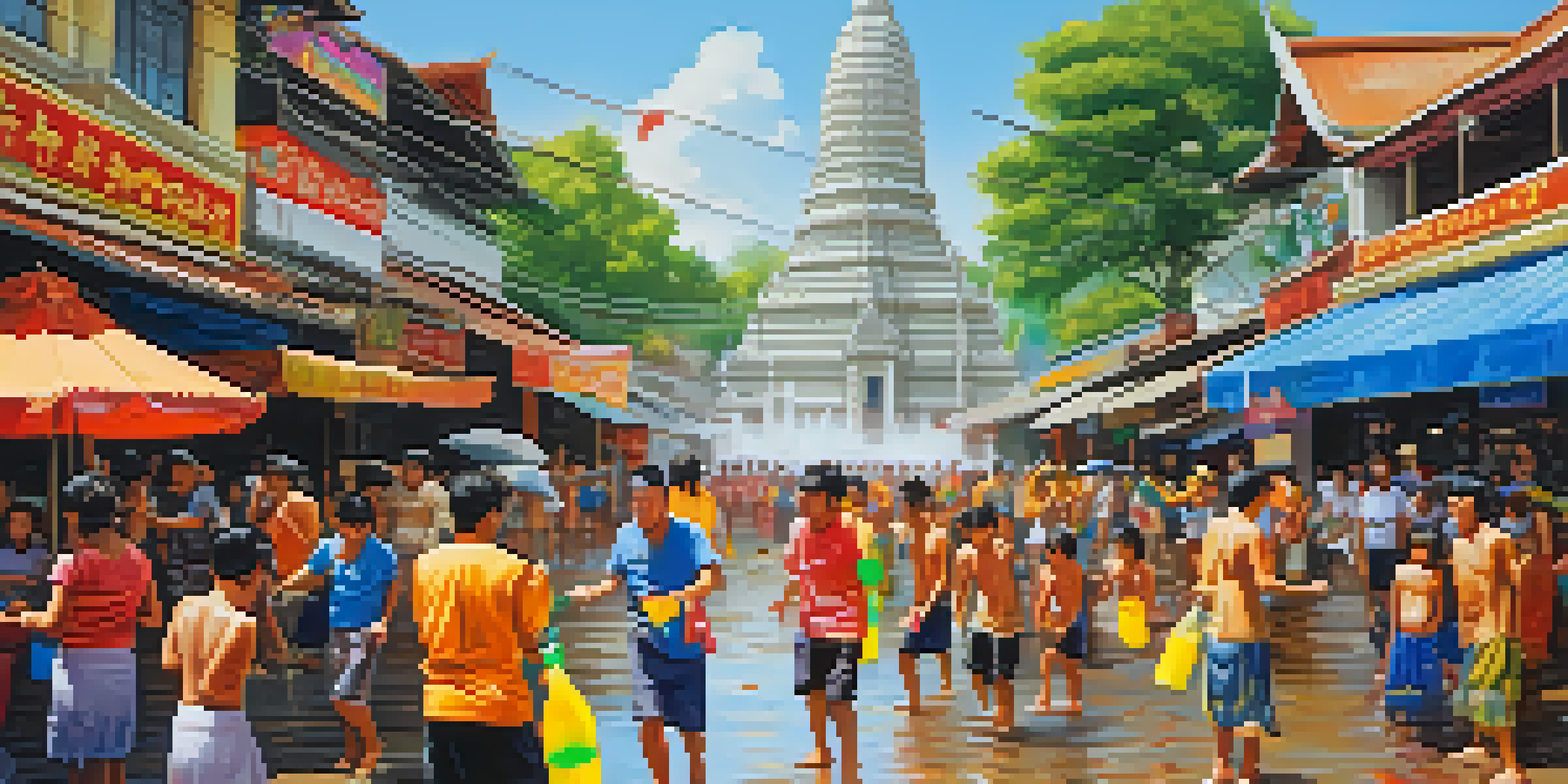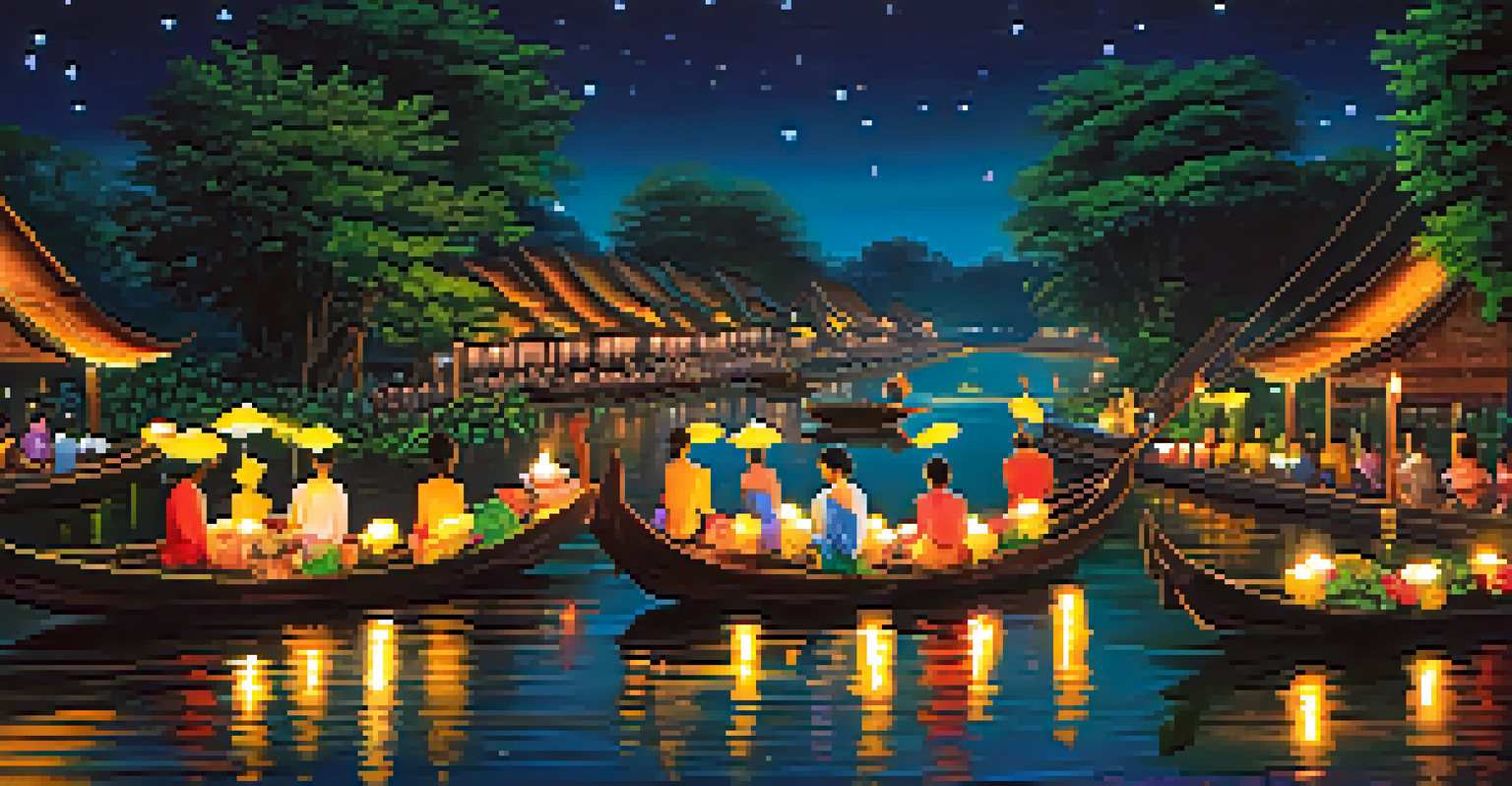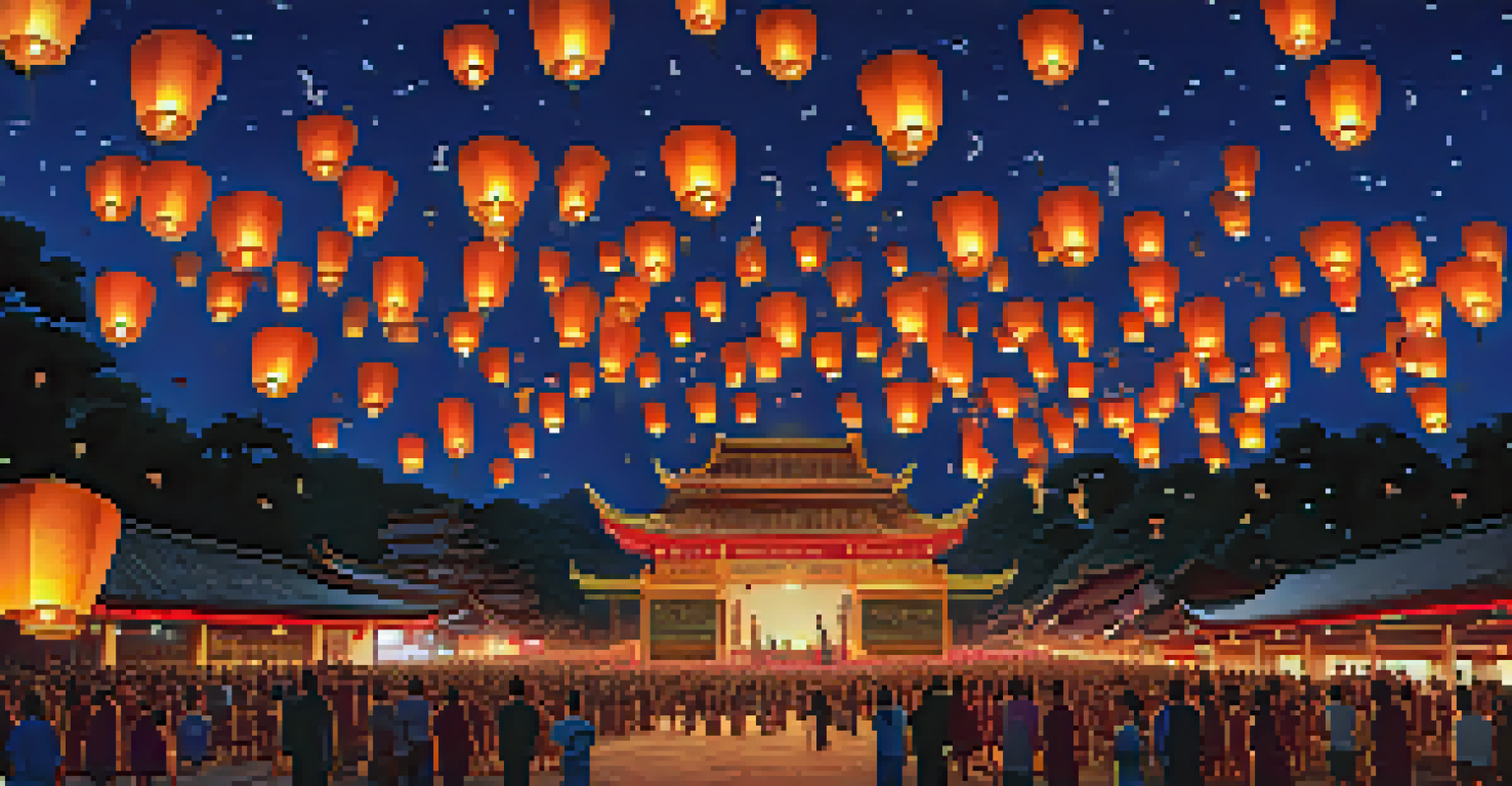Thai Festivals: Customs, Traditions, and Celebration Etiquette

An Overview of Thai Festivals and Their Significance
Thai festivals are a colorful tapestry of culture, showcasing the rich heritage and traditions of Thailand. These celebrations often reflect the country’s deep-rooted beliefs, from Buddhist practices to ancient agricultural rituals. Each festival plays a crucial role in uniting communities, fostering a sense of belonging and shared identity among the Thai people.
Festivals are the heartbeat of a culture, bringing people together in a celebration of shared beliefs and traditions.
Throughout the year, various festivals highlight different aspects of Thai culture, whether it be honoring spirits, celebrating the harvest, or marking the lunar calendar. Events such as Songkran and Loy Krathong draw locals and tourists alike, turning cities into vibrant hubs of activity and joy. These occasions offer a unique glimpse into the customs and values that define Thai society.
Understanding the significance of these festivals can enhance your experience when visiting Thailand. By recognizing the traditions behind each celebration, you can appreciate the spirit of togetherness and reverence that permeates these events. So, let’s explore some of the most popular Thai festivals and what makes them truly special.
Songkran: The Thai New Year Water Festival
Songkran, celebrated in mid-April, marks the Thai New Year and is one of the most anticipated festivals in Thailand. Its hallmark is the playful water fights that take place on the streets, symbolizing the washing away of sins and bad luck. Locals and tourists alike take part in this joyful celebration, armed with water guns and buckets, creating a lively atmosphere.

Beyond the water fights, Songkran is also a time for family reunions and paying respect to elders. Many people visit temples to make merit by offering food and alms to monks, highlighting the festival's spiritual significance. This blend of fun and reverence makes Songkran a unique cultural experience that showcases Thailand's values.
Thai Festivals Reflect Rich Culture
Thai festivals serve as vibrant expressions of the country's heritage, uniting communities and showcasing deep-rooted traditions.
When participating in Songkran, it's essential to respect local customs. Dress modestly and be mindful of the religious aspects of the festival. While it’s easy to get swept up in the excitement, taking a moment to appreciate the underlying traditions can enrich your experience.
Loy Krathong: Festival of Lights and Water
Loy Krathong, typically celebrated in November, is known as the Festival of Lights, where beautifully decorated floating baskets, or 'krathongs,' are released onto rivers and lakes. This enchanting sight symbolizes the letting go of negativity and a wish for good luck in the coming year. The festival is a captivating blend of beauty, spirituality, and community spirit.
To travel is to discover that everyone is wrong about other countries.
During Loy Krathong, families gather to participate in rituals, often involving the setting adrift of their krathongs filled with flowers, candles, and incense. This act is a way to pay respect to the water spirits and seek forgiveness for pollution. The festival also features traditional dance performances, fireworks, and cultural exhibitions, making it a vibrant celebration.
If you find yourself in Thailand during Loy Krathong, consider participating in the festivities respectfully. It's a time for reflection and gratitude, so be sure to take part in the rituals with sincerity. Engaging with locals and learning more about the symbolism behind the traditions can deepen your appreciation for this beautiful festival.
Yi Peng: Lantern Festival in Northern Thailand
Yi Peng, celebrated alongside Loy Krathong in Northern Thailand, is famous for its stunning sky lantern releases. As thousands of lanterns ascend into the night sky, it creates a magical atmosphere that captivates onlookers. The festival symbolizes the release of burdens and the hope for new beginnings, making it a deeply cherished tradition.
In addition to the lanterns, Yi Peng features various cultural activities, such as traditional music and dance performances. Locals often engage in their own rituals, including releasing krathongs and offering prayers. This collective celebration fosters a sense of unity and belonging among participants and spectators alike.
Songkran Celebrates New Year Joy
Songkran, marked by playful water fights, symbolizes the washing away of sins and emphasizes family reunions and respect for elders.
If you wish to join in on the Yi Peng festivities, remember to follow local customs. Respect the space of others during the lantern release and be mindful of the environment. This festival is as much about personal reflection as it is about community, so take the time to immerse yourself in its significance.
Vegetarian Festival: A Time for Purification
The Vegetarian Festival, primarily observed in Phuket, is a unique event focused on purification and abstaining from meat for nine days. This festival, rooted in Chinese culture, celebrates spiritual cleansing and physical detoxification through a strict vegetarian diet. It draws thousands of participants who adhere to the customs with sincerity and dedication.
During the festival, participants often engage in various rituals, including processions and ceremonies that showcase their commitment to the practices. The streets come alive with colorful parades featuring traditional music, lion dances, and even firewalking. This lively atmosphere contrasts with the serious nature of the festival's intent, highlighting the balance between joy and reverence.
If you plan to experience the Vegetarian Festival, be respectful of the participants’ beliefs. Enjoy the vibrant atmosphere while also appreciating the deeper significance behind the rituals. Sampling the delicious vegetarian food available during this time can also be a delightful way to connect with the local culture.
Makha Bucha: A Day of Faith and Reflection
Makha Bucha is a significant Buddhist holiday celebrated in Thailand, commemorating a pivotal event in the life of the Buddha. It falls on the full moon of the third lunar month and is marked by various religious observances, including temple visits and candlelit processions. This day serves as a reminder of the teachings of the Buddha and the importance of living a moral life.
On Makha Bucha, many Thais participate in rituals such as making merit, offering food to monks, and engaging in meditative practices. The atmosphere in temples is filled with a sense of peace and spirituality, as people come together to reflect on their actions and seek guidance. It's a time for individuals to reaffirm their commitment to the principles of Buddhism.
Loy Krathong: A Festival of Lights
Loy Krathong features beautifully decorated floating baskets that symbolize letting go of negativity and wishing for good fortune.
If you are visiting Thailand during Makha Bucha, consider joining in the temple activities. Dress respectfully and maintain a quiet demeanor to honor the solemnity of the occasion. This engagement can provide deeper insights into Thai culture and the significance of Buddhism in everyday life.
Customs and Etiquette During Thai Festivals
Participating in Thai festivals comes with specific customs and etiquette that reflect the culture's values. Understanding these practices can enhance your experience and show respect for the traditions. For instance, dressing modestly is crucial, especially when attending religious ceremonies or temple events.
Additionally, it's essential to be mindful of personal space and avoid disruptive behavior during festivals. Engaging with locals in a friendly manner can create a warm atmosphere, and showing appreciation for their customs goes a long way. Remember to ask for permission before photographing people during celebrations, as some may prefer not to be captured.

Lastly, always approach food offerings with respect. If you're invited to share a meal, a simple nod of gratitude is appreciated. By following these etiquette guidelines, you can enjoy a richer, more meaningful experience during Thailand's vibrant festivals.
Conclusion: Embracing the Spirit of Thai Festivals
Thai festivals are more than just vibrant celebrations; they embody the heart and soul of the Thai people. By understanding the customs, traditions, and etiquette associated with these events, you can appreciate the deeper significance behind the joy and festivities. Each festival offers a unique opportunity to connect with the culture and community in a meaningful way.
Whether you’re splashing water during Songkran or watching lanterns float into the sky at Yi Peng, immersing yourself in these experiences creates lasting memories. Engaging respectfully with local traditions allows for a richer understanding of Thailand's cultural landscape, making your travels all the more rewarding.
So, as you explore Thailand, keep an open heart and mind. Embrace the spirit of these festivals, and you may just find that the warmth of Thai hospitality and the joy of celebration will leave a lasting impression.